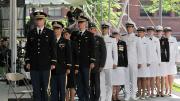The University announced this evening that the Naval Reserve Officers Training Corps (NROTC) program will return to Harvard’s campus, once the “Don’t Ask, Don’t Tell” (DADT) policy's repeal—enacted by Congress in December—takes effect. That is expected to happen as soon as this summer, ending nearly 40 years of formal separation dating from the Vietnam War era.
According to the announcement, President Drew Faust and Secretary of the Navy Ray Mabus will sign an agreement that provides for:
- appointment by the University of an NROTC director at Harvard, with office space, and access to classrooms and athletic fields for participating students; and
- resumption by Harvard of direct financial responsibility for the costs of student participation in the program (such costs have been covered in recent decades by alumni donations).
In academic terms, Harvard Navy and Marine Corps midshipmen will continue to take their NROTC classes at MIT, home to the courses and faculty who have trained area students enrolled in the program. This decision was expected, because military leaders have indicated it is uneconomical to expand the number of ROTC programs to multiple campus sites, with each serving a potentially small number of students. Tonight’s announcement notes that maintaining the current consortium arrangement is “best for the efficiency and effectiveness” of the operations. From Harvard’s perspective, this means that issues of faculty appointments and class credit for new ROTC courses within the College curriculum do not arise now.
President Faust, as previously reported, has indicated her strong support for renewing ties to ROTC, once the DADT prohibition on military service by openly gay men and women was abolished. She comes from a military family, made a point of appearing at commissioning ceremonies during Commencement week, and seemed to establish a strong rapport with General David H. Petraeus (then leader of the Central Command, and now leading U.S. military operations in Afghanistan) when he spoke at the 2009 exercises.
In this evening’s announcement, Faust said, “Our renewed relationship affirms the vital role that the members of our Armed Forces play in serving the nation and securing our freedoms, while also affirming inclusion and opportunity as powerful American ideals. It broadens the pathways for students to participate in an honorable and admirable calling and in so doing advances our commitment to both learning and service.”
Mabus called the agreement “good for the University, good for the military, and good for the country. Together, we have made a decision to enrich the experience open to Harvard’s undergraduates, make the military better, and our nation stronger.”
According to the announcement:
- Harvard is also pursuing discussions to renew formal ties with ROTC programs serving other branches of the Armed Forces; and
- Faust will form an ROTC implementation committee chaired by Cabot associate professor in applied science Kevin (“Kit”) Parker, who has served three tours in Afghanistan as an army major. (Parker’s bioengineering research has recently been expanded to include new inquiries into traumatic brain injury, prompted by his military experience.)
Harvard, according to the announcement, was one of the six original partner institutions of NROTC in 1926. Twenty College students currently participate in ROTC programs, including 10 in NROTC. In addition to Faust’s interest in restoring the program, Harvard may be enjoying a bit of geographic luck—in the proximity of the current ROTC operations just downriver at MIT—in gaining an ROTC presence on campus so quickly. Other institutions that have taken steps to re-establish ROTC in the wake of DADT’s appeal, including Stanford and Yale, are not so fortunately situated.









